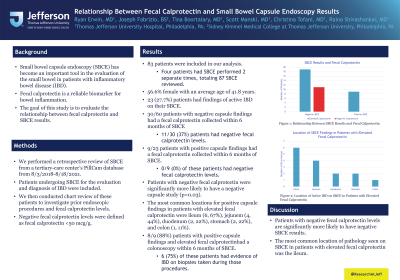Back


Poster Session D - Tuesday Morning
Category: IBD
D0346 - Relationship Between Fecal Calprotectin and Small Bowel Capsule Endoscopy Results
Tuesday, October 25, 2022
10:00 AM – 12:00 PM ET
Location: Crown Ballroom

Has Audio

Ryan Erwin, MD
Thomas Jefferson University Hospital
Philadelphia, PA
Presenting Author(s)
Ryan Erwin, MD1, Joseph Fabrizio, BS2, Tina Boortalary, MD1, Scott Manski, MD1, Christina Tofani, MD1, Raina Shivashankar, MD1
1Thomas Jefferson University Hospital, Philadelphia, PA; 2Sidney Kimmel Medical College at Thomas Jefferson University, Philadelphia, PA
Introduction: Small bowel capsule endoscopy (SBCE) has become an important tool in small bowel evaluation in patients with inflammatory bowel disease (IBD). Fecal calprotectin (FCP) is a reliable biomarker for bowel inflammation. In this study, we sought to evaluate the relationship between FCP and SBCE results.
Methods: We performed a retrospective review of SBCE using a tertiary-care center’s PillCam database from 8/3/2018-8/18/2021. Patients undergoing SBCE for the evaluation and diagnosis of IBD were included. We then conducted chart review of these patients to investigate prior endoscopic procedures and FCP levels. Normal FCP levels were defined as less than 50 mcg/g.
Results: A total of 83 patients were included in our analysis (56.6% female, mean age 41.8 years [range 20-75 years]). Four patients had SBCE performed 2 separate times, totaling 87 SBCE reviewed. Twenty-three (27.7%) patients had findings compatible with active IBD on their SBCE.
Of the 60 patients with negative capsule findings, 30 had a FCP collected within 6 months of SBCE. 11/30 (37%) of these patients had normal FCP levels. Of the 23 patients with positive capsule findings, 9 had a FCP collected within 6 months of SBCE. 0/9 (0%) of these patients had normal FCP levels. Patients with normal FCP were significantly more likely to have a negative capsule study (p=0.03). All 11 patients with normal FCP had a colonoscopy prior to SBCE, and 0/11 (0%) had findings consistent with IBD on biopsy.
The most common locations for positive capsule findings in patients with elevated FCP were as follows: ileum (6 patients, 67%), jejunum (4, 44%), duodenum (2, 22%), stomach (2, 22%), and colon (1, 11%). Of the 9 patients with positive capsule findings and elevated FCP, 8 (88%) had a colonoscopy within 6 months of SBCE. Six of these patients (75%) had evidence of IBD in their colon.
Discussion: Our study investigated the relationship between FCP and SBCE results. Patients with normal FCP levels are significantly more likely to have negative SBCE results, and these patients were also more likely to have a normal colonoscopy. The most common location of pathology seen on SBCE in patients with elevated FCP was the ileum. This suggests that that FCP may be more useful in evaluating distal, rather than more proximal, bowel inflammation.
Disclosures:
Ryan Erwin, MD1, Joseph Fabrizio, BS2, Tina Boortalary, MD1, Scott Manski, MD1, Christina Tofani, MD1, Raina Shivashankar, MD1. D0346 - Relationship Between Fecal Calprotectin and Small Bowel Capsule Endoscopy Results, ACG 2022 Annual Scientific Meeting Abstracts. Charlotte, NC: American College of Gastroenterology.
1Thomas Jefferson University Hospital, Philadelphia, PA; 2Sidney Kimmel Medical College at Thomas Jefferson University, Philadelphia, PA
Introduction: Small bowel capsule endoscopy (SBCE) has become an important tool in small bowel evaluation in patients with inflammatory bowel disease (IBD). Fecal calprotectin (FCP) is a reliable biomarker for bowel inflammation. In this study, we sought to evaluate the relationship between FCP and SBCE results.
Methods: We performed a retrospective review of SBCE using a tertiary-care center’s PillCam database from 8/3/2018-8/18/2021. Patients undergoing SBCE for the evaluation and diagnosis of IBD were included. We then conducted chart review of these patients to investigate prior endoscopic procedures and FCP levels. Normal FCP levels were defined as less than 50 mcg/g.
Results: A total of 83 patients were included in our analysis (56.6% female, mean age 41.8 years [range 20-75 years]). Four patients had SBCE performed 2 separate times, totaling 87 SBCE reviewed. Twenty-three (27.7%) patients had findings compatible with active IBD on their SBCE.
Of the 60 patients with negative capsule findings, 30 had a FCP collected within 6 months of SBCE. 11/30 (37%) of these patients had normal FCP levels. Of the 23 patients with positive capsule findings, 9 had a FCP collected within 6 months of SBCE. 0/9 (0%) of these patients had normal FCP levels. Patients with normal FCP were significantly more likely to have a negative capsule study (p=0.03). All 11 patients with normal FCP had a colonoscopy prior to SBCE, and 0/11 (0%) had findings consistent with IBD on biopsy.
The most common locations for positive capsule findings in patients with elevated FCP were as follows: ileum (6 patients, 67%), jejunum (4, 44%), duodenum (2, 22%), stomach (2, 22%), and colon (1, 11%). Of the 9 patients with positive capsule findings and elevated FCP, 8 (88%) had a colonoscopy within 6 months of SBCE. Six of these patients (75%) had evidence of IBD in their colon.
Discussion: Our study investigated the relationship between FCP and SBCE results. Patients with normal FCP levels are significantly more likely to have negative SBCE results, and these patients were also more likely to have a normal colonoscopy. The most common location of pathology seen on SBCE in patients with elevated FCP was the ileum. This suggests that that FCP may be more useful in evaluating distal, rather than more proximal, bowel inflammation.
Disclosures:
Ryan Erwin indicated no relevant financial relationships.
Joseph Fabrizio indicated no relevant financial relationships.
Tina Boortalary indicated no relevant financial relationships.
Scott Manski indicated no relevant financial relationships.
Christina Tofani indicated no relevant financial relationships.
Raina Shivashankar: Abbvie – Grant/Research Support, Speakers Bureau. Janssen – Advisory Committee/Board Member, Grant/Research Support.
Ryan Erwin, MD1, Joseph Fabrizio, BS2, Tina Boortalary, MD1, Scott Manski, MD1, Christina Tofani, MD1, Raina Shivashankar, MD1. D0346 - Relationship Between Fecal Calprotectin and Small Bowel Capsule Endoscopy Results, ACG 2022 Annual Scientific Meeting Abstracts. Charlotte, NC: American College of Gastroenterology.
